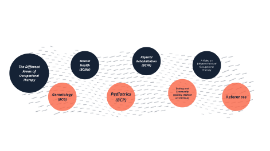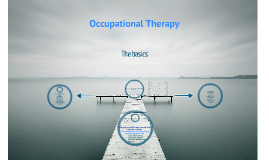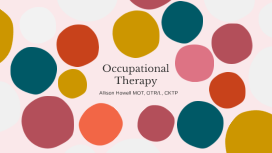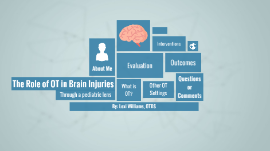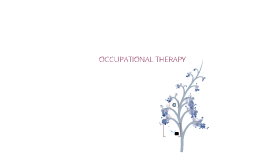Occupational Therapy Presentation
Transcript: The Role of OT in Brain Injuries By: Lexi Williams, OTDS Through a pediatric lens About Me About Me 1. Holmen, WI 2. Minneapolis, MN 3. Fort Wayne, IN 4. Mount Juliet, TN 7th Grade Fieldtrip Athletic Training Aaron's football career Fieldwork Level I- Inpatient Rehab Stroke, TBI Fieldwork Level II- Pediatric Outpatient mTBI Fieldwork Level II- Skilled Nursing Stroke, TBI Why Brain Injuries? Your guess is as good as mine I have thoroughly enjoyed every experience/setting Where to Next? What is OT? The therapeutic use of occupations, including everyday life activities with individuals, groups, populations, or organizations to support participation, performance, and function in roles and situations in home, school, workplace, community, and other settings. Definition of Occupational Therapy OT Breakdown Occupations: Activities done daily Play, social participation, school, eating, managing health or finances, dressing, showering Goal of OT: Maximize participation and independence with roles, habits, and routines Approach: Evidence-based, client-centered, & holistic Diversity of Practice Evaluation Physician referral Skilled nursing- write order and physician signs Referral Case Study Referral 9 years old Boy Diagnosis: Mild Cognitive Impairment Evaluation 1. Interview/observation 2. Standardized assessments 3. Goals Evaluation Interview/Observation Fell off 4-wheeler 3 months before Diagnosis of concussion & broken arm Recent move to Nashville 2 months ago Significant drop in grades since move Difficulty remembering school work Irritable mood Frequent headaches Presents with typical gait No noticeable physical impairment Evaluation Assessments GOAL-Oriented Assessment Sensory Profile Cognitive Testing Age appropriate math worksheet Evaluation Findings Assessment Findings Significantly below averages for attention Below average for short-term memory Required assistance to walk over uneven surfaces Became flustered during cognitive testing Recognized his impairments Client-Centered Goals What do you want to get from therapy? "I want to enjoy school again" "I want to do better in school" "I want to make more friends" Approach Increasing attention to task Develop coping strategies to manage external stimuli Improve gross motor coordination through vestibular and visual interventions Determine best mode for "jogging" his memory during daily tasks Goal Writing Broad approach Insurance Children's responses to interventions change regularly Progress reports will display progress Interventions Caregiver Education Vision- Ball rolling, lights Vestibular- swings Motor- Obstacle course Social- Peer building Cognition- Post-it notes, visual schedule Interventions Just Right Challenge Be aware of symptoms Connect with caregiver after session Stay positive Things to Remember Outcomes By 10 weeks, EVERY assessment was within "average" Friends at therapy Excited for school Outcomes Communication with school M-FUN Assessment Vision Screening Self Reflection Other OT Settings More severe brain injuries Rancho level 4 (max assistance) Interprofessional collaboration Additional brain injuries: Stroke Inpatient Rehab Falls are very common Concussion assessments? Short staffed Typically, therapists spend most time with patients Monitor symptoms Therapy needs to account for potential brain injury Nursing Homes/Long Term Care Varies greatly by state Substantial education with school-based accommodations Great resources within school regarding brain injury Schools Questions or Comments Questions/Comments








